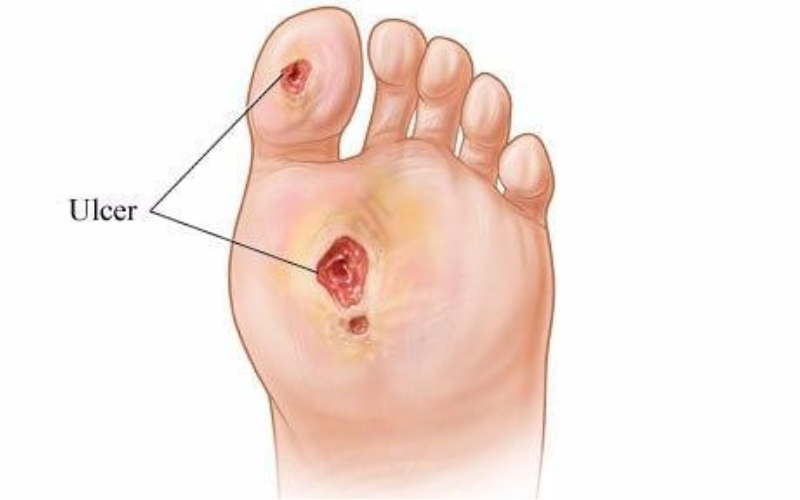 A diabetic
foot ulcer is an open sore or wound, often occurring on the foot, resulting
from complications related to diabetes, such as nerve damage, poor circulation,
and an increased risk of infection. These ulcers can vary in severity and,
without proper care, can lead to serious complications like infection, tissue
damage, and even amputation in extreme cases. Prevention and management
strategies, including regular foot care, appropriate footwear, and blood sugar
control, are critical to avoid these risks.
A diabetic
foot ulcer is an open sore or wound, often occurring on the foot, resulting
from complications related to diabetes, such as nerve damage, poor circulation,
and an increased risk of infection. These ulcers can vary in severity and,
without proper care, can lead to serious complications like infection, tissue
damage, and even amputation in extreme cases. Prevention and management
strategies, including regular foot care, appropriate footwear, and blood sugar
control, are critical to avoid these risks.
Causes of
Diabetic Foot Ulcers:
- Peripheral Neuropathy:
Elevated blood sugar levels can damage nerves in the feet, reducing
sensation and making injuries less noticeable.
- Poor Circulation: Diabetes
can restrict blood flow to the feet, impairing wound healing and
increasing the risk of infection.
- Foot Deformities: Conditions
like bunions, hammertoes, and Charcot foot can create pressure points and
abnormal weight distribution, raising the risk of ulcers.
- Trauma or Injury: Minor
injuries, such as blisters or cuts, can escalate into ulcers due to
reduced sensation and impaired healing.
Symptoms
of Diabetic Foot Ulcers:
- Open Sores: Ulcers may appear
as shallow or deep wounds, often on the sole or sides of the foot. They
can be painful, but due to neuropathy, some ulcers may be painless.
- Infection: Infected ulcers
may present with redness, warmth, swelling, pus, or a foul-smelling
discharge.
- Delayed Healing: Diabetic
ulcers typically heal slowly, or they may worsen if not properly treated.
- Foot Deformities: Severe
ulcers can lead to tissue loss and deformities in the foot structure.
Treatment
Using Custom Orthotics:
Custom
orthotics are an effective solution for both preventing diabetic foot ulcers
and supporting healing. Here’s how they contribute to foot health:
- Pressure Redistribution:
Custom orthotics evenly distribute pressure across the foot, minimizing
high-pressure areas that can lead to ulcers.
- Shock Absorption: Orthotics
provide added cushioning, protecting the feet from trauma during walking
and preventing injury-induced ulcers.
- Arch Support: Proper arch
support helps improve foot alignment, reducing strain and promoting
healthy weight distribution.
- Custom Fit: Tailored to an
individual’s foot shape and gait, custom orthotics offer precise support
and enhanced comfort.
- Footwear Guidance: Orthotic
specialists can recommend suitable footwear that complements custom
orthotics, further lowering the risk of ulcers.
- Monitoring: Diabetic patients
should have regular foot exams with healthcare providers, including
podiatrists, to detect any foot issues early and address them promptly.
By
incorporating custom orthotics into diabetes care, individuals can better
protect their feet, reduce the risk of ulcers, and support healing if ulcers
have already developed.
There are no products to list in this category.
